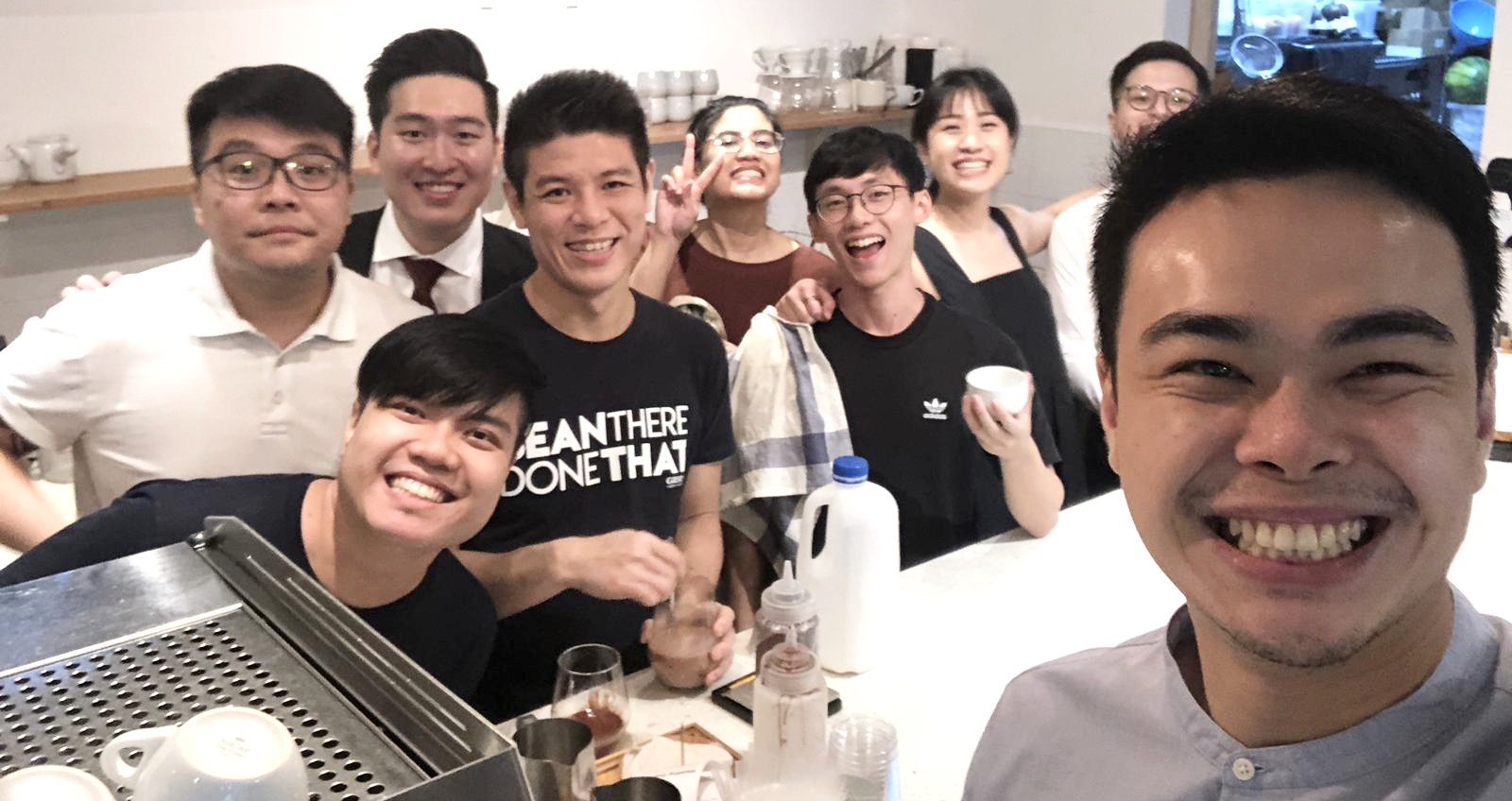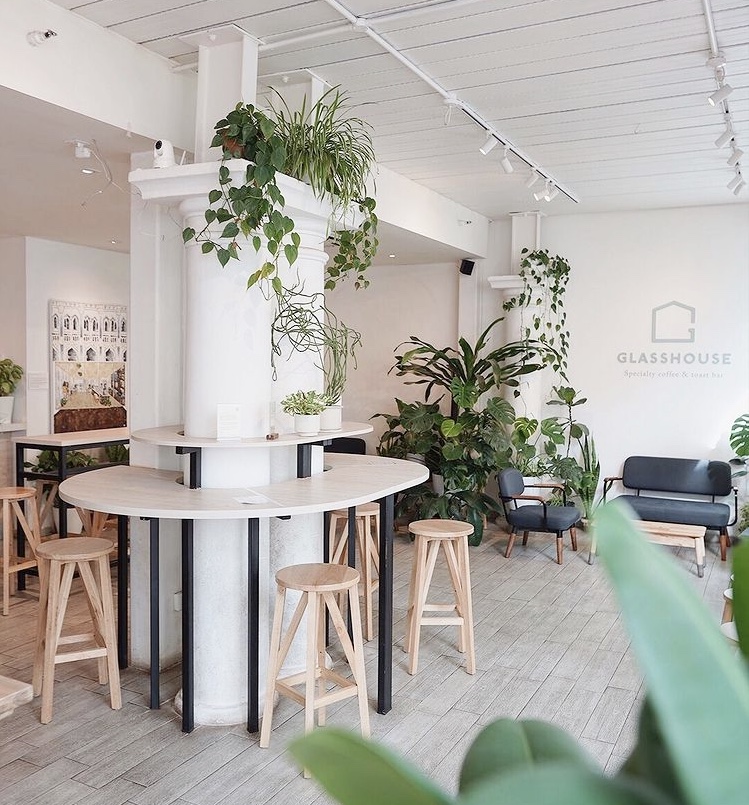“It is my Dad’s business”: Josh Liew of The Glasshouse wants staff to be more than baristas
Gracia Yap // May 7, 2021, 6:08 pm

"If you come here as a level one barista and leave as a level one barista, then you are wasting your time," says Josh Liew (right) to his staff at The Glasshouse. "I want them to leave Glasshouse, if they ever leave, as better versions of themselves." All photos courtesy of Josh Liew or from theglasshousesg on Instagram.
Resembling a greenhouse with its lush plants and with natural light streaming through the floor-to-ceiling windows, The Glasshouse draws streams of coffee lovers and Instagrammers throughout each day.
As they relish their coffees from a rotating lineup of local roasters, few realise that The Glasshouse is also a hothouse for those who work within.
“Leadership with no relationship gives you no ground to speak into their lives”
Co-founder Josh Liew‘s love for coffee began when he was studying for a business degree in Melbourne.
God also spoke to him through a book, Great Businessmen by David Yonggi Cho. The concept of the business owner as an element of change affected him profoundly.
He was certain that he would own a business one day. He wanted to be “a business owner who can create lasting impact in society”.
Liew embarked on that journey, cutting his teeth at Starbucks and Common Man Coffee Roasters in Singapore.
Then through a former partner, he got wind that CHIJMES was looking for a coffee kiosk to drive younger crowds into the historic complex.

The Glasshouse when it was taking shape in in a pop-up glass container at CHIJMES.
“CHIJMES found us rather than me choosing them,” said Liew, 33.
He named his speciality coffee and toast bar The Glasshouse. For it was initially housed in a glass-enclosed cargo container.
Turning three
When The Glasshouse turned three last year, Liew started setting the work culture, putting in writing its core values that guide his decisions. He sought the advice of an older brother at church.
Liew personally orientates new staff and part-timers and runs through the company’s values with them “because they need to know where the vision flows from”.
Gratitude, honour, integrity are some of the core values.
“When customers come, I’m grateful,” said Liew.

A usually full house is one thing that Josh Liew is grateful for. (Photo taken before Covid.)
He certainly has much to be grateful for.
A heavy downpour did not stem the tide of customers streaming into The Glasshouse on the Monday afternoon when Salt&Light visited. Sitting down outside the packed cafe at CHIJMES, Liew shared his business philosophy, which is based on Kingdom values.
My Dad’s business
Liew says that The Glasshouse belongs to God.
“I always tell people, ‘This business is my Father’s.’
“Then they think it’s my earthly father’s.”
“It is my Dad’s business,” said Liew with a laugh as he pointed upwards.

The minimal aesthetic of The Glasshouse gives it a feel of calm.
Rooted in his identity in Christ, Liew knows that he is a child of God before he is a servant of God.
God has always called us sons and daughters.
“A son and a servant have very different motivations. A son is motivated out of love for the Father, but a servant’s motivation is out of fear of his master.”
The delivery
In a similar vein, Liew wants to build a relationship of love and trust with his staff. They range from polytechnic students to adults in their 30s.
“I feel that I can have the capacity to love them because God first loved me,” said Liew, referencing 1 John 4:19.
He also referred to John 21:15-17, in which Jesus asked if Peter loved Him, and told Peter to feed His sheep.
“A son is motivated out of love for the Father, but a servant’s motivation is out of fear of his master.”
“As a leader, manager or supervisor, you need to understand the condition of your sheep. You need to sit them down, speak to them, understand and slowly build trust before they’re willing to open up to you.”
He recounted a time when he sat down with a foreign staff member, B* (not his real name), who had attitude issues. Speaking with him, Liew found out that he missed home and was unable to return because of the pandemic.
“In my heart, I knew I couldn’t do much for him. He was in so much pain. But if I were to fire him because of his bad attitude, I would have shortchanged him.”
Instead, Liew quietly sent food to B’s family. B learnt about the delivery from his father. He had a good laugh with Liew, who had placed the order in B’s nickname, which was unfamiliar to his family.
“Leadership with no relationship gives you no ground to speak into their lives,” said Liew.
Trickle down effect
In Singapore, Liew learnt about the trade at Common Man Coffee Roasters. He worked different roles from floor barista to public relations and from production to sales over three years.
Liew’s guide was a manager who taught him the proper way to write an email, how to speak with customers, and how to use Excel.
If Liew made a mistake, his manager was the first to apologise to him for not having trained him better. After work the next day, his manager would help Liew refine his skills.

When The Glasshouse first started, Josh’s church members and pastor brought others including other pastors. And soon other pastors started to have meetings with their people at The Glasshouse too.
The kindness and grace that previous bosses showed Liew have had a trickle down effect.
Recently, a staff member dropped a tray of more than 20 pastries. She bravely owned up. He told her: “It’s fine, just make the money back for me.”
Liew is also careful not to pass down negative behaviours like racial discrimination he experienced while overseas.
Cafe coach
At the beginning of each year, Liew sets the company’s goal.
He asks each team member how they want to help the company achieve its goal, as well as their own personal developmental goals.
“I actually keep them accountable.”
If Liew made a mistake, his manager was the first to apologise to him for not having trained him better.
Three months later, he would sit down with them and ask how they have been moving in the direction of these goals. Liew hopes to see his staff grow – both in skill set and character.
For the last three months, he has been coaching three of his new staff. They hope to eventually open their own businesses. Every month, Liew teaches them a new topic and gives them homework.
He also takes the three cafe hopping as part of the learning process.
“I will ask them what they like or dislike about the cafe. And I will share with them my experiences on why we should or shouldn’t do something.”
For instance, a cafe they visited had plywood decking the sink. Liew advised his staff never to do this as plywood and water is a recipe for rot.
Fuelling their passion
This year, Liew is piloting a new initiative to allow staff to pursue their passions.
Each staff is given $500 to learn anything related to the business. They build skills in areas they are interested in. And it benefits the company.
Some bought cookery books.
One bought a gelato machine and is learning to make the frozen dessert with the aim of selling it at The Glasshouse.

One manager enrolled himself at a coffee roasting academy, even before Josh gave each staff $500 to develop a passion.
Another is preparing to take part in a competition against other baristas.
In doing so, Liew is giving his staff the opportunity to “learn to fish”, to empower themselves.
“I always tell (my team): ‘Learning is two ways – caught and taught. Taught is when I teach you, caught is when you observe and learn.
“‘If you come here as a level one barista and leave as a level one barista, then you are wasting your time.’
“I want them to leave Glasshouse, if they ever leave, as better versions of themselves and they all know that.”
Five-day work week
The Glasshouse is open daily. But each team member only works a five-day week – one day less than the typical work week for many in the F&B (food and beverage) industry.
“Learning is two ways … Taught is when I teach you, caught is when you observe and learn.”
This is to ensure that they have enough rest in order to perform better at work.
The principle of rest is modelled after God’s commandment to keep the Sabbath holy (Exodus 20:8-11).
“So it means something to God,” said Liew.
“Keeping the Sabbath, I feel, really teaches us to trust God. God says, ‘You take a day off. Let Me show you, there is no lack.'”
Liew is happy to see more of his peers following suit and adopting a five-day work week.
Steward and planetshaker
Liew listens to podcasts on leadership each day for inspiration.
He is also a cell group leader in the Singapore branch of Planetshakers – the church he attended in Australia.
“Out of my relationship and love for God, I want to be someone who can do what God loves, to fulfil my calling in life.
“And what does God love? God wants His kingdom to be established and wants souls to be saved, so that none shall perish (John 3:16).”
In running The Glasshouse, Liew puts his trust in God as he strives to love God through nurturing his staff each day.
“At the end of the day, I’m just a steward. I’m grateful and it’s a privilege that God let me steward His business,” said Liew.
RELATED STORIES:
Break my heart, Lord, for what breaks yours: Refugees, missions and you
We are an independent, non-profit organisation that relies on the generosity of our readers, such as yourself, to continue serving the kingdom. Every dollar donated goes directly back into our editorial coverage.
Would you consider partnering with us in our kingdom work by supporting us financially, either as a one-off donation, or a recurring pledge?
Support Salt&Light




